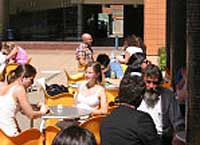Linguistics - LINGA23704
Stream Summary
Faculty: ARTSC - Faculty of Arts&Social Science
School: School of International Studies
Contact: intlstudies@unsw.edu.au
Program: 3704 - Engineering / Arts
Award(s):
Bachelor of Arts (Minor)
Information valid for students commencing 2013.
Students who commenced prior to 2013 should go to the Handbook's Previous Editions
Stream Outline
Aims of the Minor Stream
The aims and objectives of the BA minor stream in Linguistics relate to two areas, knowledge and skills:
Knowledge:
1. To foster an understanding of the nature of a linguistic theory, of the core analytical concepts relevant to each area of analysis.
2. To develop an understanding of the place of language in the interdisciplinary study of the cognitive sciences (including cognitive psychology, sociology, cognitive anthropology, neurology, and artificial intelligence).
3. To recognise the technical and ethical issues involved in the collection and documentation of data from language consultants in the field or from subjects in the experimental laboratory.
4. To demonstrate an understanding of the scientific method through the critical evaluation of the relationship between linguistic data and linguistic theory, in particular the central role of hypotheses and the testing of hypotheses;
5. To demonstrate an understanding of the relationship between social, educational and cultural issues and such topics as the analysis of spoken and written text, the analysis of sentences and clauses, the analysis of vocabulary, the study of standard and non-standard language and the processes of standardisation, the analysis of spoken interaction, the investigation of literacy practices.
6. To show how the language situation in contemporary Australia is located within an historical and comparative context.
7. To engage critically with fundamental linguistic questions about value in both ethical and aesthetic contexts.
Skills:
1. To plan, design and execute a piece of research or an inquiry.
2. To communicate ideas about language in writing or by oral presentation.
3. To evaluate and challenge conventional doctrines through the articulation of novel research questions.
4. To develop the ability to incorporate findings from other disciplines.
5. To search out, synthesise and discuss information stored on paper, electronically or visually.
6. To develop the skills of critical, creative and imaginative thinking about the role of language in society, culture and the arts.
Stream Structure
- ARTS1690 The Structure of Language (6 UOC)
- ARTS1691 The Use of Language (6 UOC)
- ARTS2690 Semantics and Pragmatics (6 UOC)
- ARTS2692 Generative Grammar (6 UOC)
- ARTS2693 Psycholinguistics (6 UOC)
- ARTS2694 Phonology (6 UOC)
- ARTS2698 Intercultural Interaction (6 UOC)
- ARTS3691 Sociolinguistics (6 UOC)
- ARTS3695 Language Planning (6 UOC)









